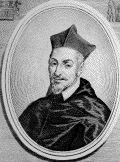| Profile | Major Works | Resources |
Juan de Lugo, 1583-1660.

Spanish Jesuit scholar, originating from a noble family of Seville, studied law at the university of Salamanca, although well after its heyday. Against his father's wishes, Juan de Lugo abandoned his legal studies and joined the Jesuit Order in 1603. After teaching for a while at Medina del Campo and Valladolid, de Lugo was invited to Rome, where he spent the rest of his career. He was appointed cardinal, on the strength of his theological writings (although de Lugo was famously shy in getting them published, manuscript copies made the rounds in theological circles).
In his principal economic work is found in his legal treatise De justitia et jure (1642). de Lugo went further than his Salamanca and Jesuit predecessors in departing from Scholastic thought. He was perhaps the first to combine scarcity and utility in a single theory of value. Also defined profits as "wages" for entrepreneurial services. His discussion of usury devastated the Scholastic arguments.
It is perhaps significant that 1642 was also the year in which Thomas Hobbes published De Cive. It is perhaps not unjust to regard de Lugo as the closing argument of the Salamanca School, completing the transition from Scholasticism to natural philosophy.
|
Major Works of Juan de Lugo
|
|
HET
|
|
Resources on Juan de Lugo
|
All rights reserved, Gonšalo L. Fonseca
